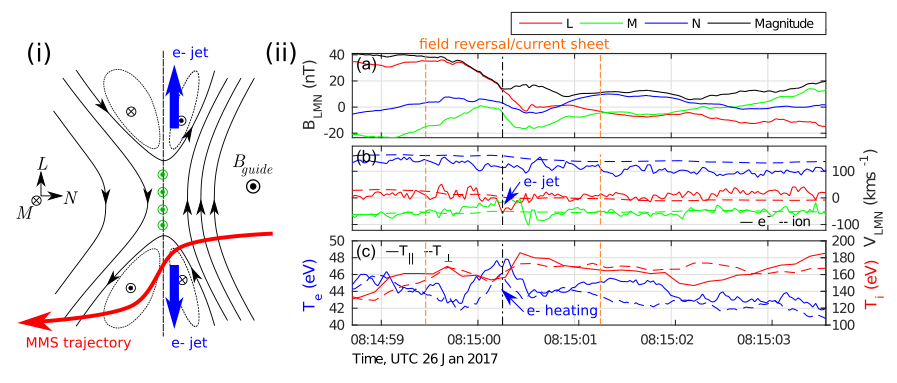MIST
Magnetosphere, Ionosphere and Solar-Terrestrial
Observations of magnetic reconnection in Earth’s bow shock
by Imogen Gingell (Imperial College London)
The bow shock is a thin transition between super-sonic solar wind flows and sub-sonic flows in the Earth’s magnetosheath, during which the plasma is rapidly compressed and heated. In space plasmas, particle collisions cannot provide sufficient energy dissipation to slow the flow to sub-sonic speeds. Instead, nonlinear, electromagnetic plasma processes must be responsible.
Recent simulations (hybrid and fully kinetic particle-in-cell) have shown that current sheets and magnetic islands may be generated within the bow shock’s thin transition region (see Gingell et al 2017). This implies that magnetic reconnection, i.e. a localised change in the topology of the magnetic field, may be among the nonlinear processes responsible for heating in the shock transition layer. However, reconnection is not currently included in shock models.
Using data provided by NASA’s Magnetospheric Multiscale mission (MMS), we have now detected signatures of reconnection occurring at current sheets embedded in the shock. These signatures include a reversal of the magnetic field direction over ion inertial scales and a coincident super-Alfvénic jet of electrons corresponding the outflow from the reconnection site (see Fig 1). The increase in the electron temperature is consistent with previous observations of reconnection at the magnetopause. However, the lack of an ion jet or heating is similar to recent observations within the magnetosheath.
Now that we have confirmed that reconnection can occur within the bow shock, we must assess the broader impact of reconnection on heating and particle acceleration at shocks, explore the evolution of reconnecting structures as they convect downstream, and determine the parameter regime over which shock reconnection can occur.
For more information, please see the paper below:
Gingell, I., Schwartz, S. J., Eastwood, J. P., Burch, J. L., Ergun, R. E., Fuselier, S., et al. (2019). Observations of magnetic reconnection in the transition region of quasi‐parallel shocks. Geophysical Research Letters, 46. https://doi.org/10.1029/2018GL081804

Fig 1. (i) schematic of the structure of a reconnecting current sheet, showing magnetic field (black), current density (green), electron outflow jets (blue) and spacecraft trajectory for the observed event (red). (ii) observations of a current sheet in the bow shock, showing (a) magnetic field, (b) electron and ion bulk velocities, and (c) electron ion temperatures.